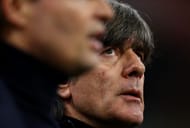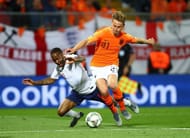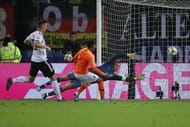Netherlands thrashed Germany 4-2 in a Euro 2020 qualifier at the Volksparkstadion in Hamburg.
The visitors started the more confident of the two and immediately imposed their passing game. However, the hosts struck against the run of play in the ninth minute through Serge Gnabry.
Germany had a few more opportunities to double their advantage but they failed to do so as the Oranje only trailed 1-0 at the break.
After the restart, Frenkie De Jong got Netherlands going with a 59th-minute equaliser. Seven minutes later, Jonathan Tah bundled the ball into his own net to hand the away side the advantage.
However, Toni Kroos levelled things up from the penalty spot in the 73rd minute when Matthijs De Ligt was adjudged to have handled the ball inside the box.
Yet, the joy was short-lived for the hosts as Donyell Malen made the net bulge in the 79th minute.
The home side pushed for a leveller in the dying stages but that left gaps at the back. Netherlands took full toll and killed the game off in stoppage time courtesy Georginio Wijnaldum.
Here is a look at the talking points from the game:
#5 Germany and Netherlands serve up an intense tactical battle in the first half

Joachim Low decided to field a back three and opted for Matthias Ginter, Niklas Sule and Tah as his centre-back trio. Lukas Klosterman and Nico Schulz were entrusted with manning the flanks while Joshua Kimmich was paired alongside Kroos in the heart of midfield.
Upfront, Gnabry, Marco Reus and Timo Werner were preferred with the hosts looking to infuse their forward line with pace.
Netherlands, meanwhile, stuck to their tried and tested 4-3-3 system and deployed 10 of the 11 players that had featured in the UEFA Nations League final against Portugal in June.
Thus, at the outset, the Germans had signalled their intentions to sit deep, cede possession to the Dutch and then hit the visitors on the break.
The above worked a charm when the hosts broke through the away side’s defensive line. Klosterman was found expertly by Kimmich and the wing-back proceeded towards goal before firing a tame effort at the goalkeeper.
However, Gnabry was alert enough to pounce on the rebound and make the net ripple.
The same trend continued throughout the half as Netherlands increasingly looked for openings in the offensive third but were thwarted by Germany’s deep line.
In response, the Oranje tried to push one of their three central midfielders further to carve an opening.
Germany responded by dropping Kimmich a little deeper and that allowed one of the front three to complement Kroos in the middle third, thereby offering an extra passing outlet under pressure.
Moreover, the home side’s deep defensive line nullified the Dutch forwards’ pace threat and that forced the Oranje to go hunting for a goal. Consequently, they left a few more gaps at the back but the hosts were unable to exploit the aforementioned weakness.
Over the years, Germany and Netherlands have immersed themselves in some titanic encounters, with goals galore.
However, on Friday, that particular aspect failed to come to the fore in the opening 45 minutes.
Yet, courtesy the myriad strategies both sides deployed, the first half was extremely high on the tactical quotient.
#4 Germany’s contentious penalty brings VAR into the spotlight again

Ever since the Video Assistant Referees (VAR) were tried out at last summer’s World Cup, the technology and its usage has divided opinion. Though some have argued that it has made officiating less error-prone, others have thought that it has added an unwanted dimension to the game, while also not being completely fool-proof.
And, those murmurs have become louder in recent weeks, especially after VAR’s introduction into the Premier League. It has become so synonymous with controversy that the game between Germany and Netherlands, which didn’t even use the system, again raised questions if VAR is indeed a boon or a bane to the footballing fraternity.
In Hamburg, the Germans were awarded a contentious penalty, which could’ve been chalked out on two counts.
Firstly, the initial run made by Schulz before crossing the ball could’ve been given as an off-side, considering the full-back’s shoulder seemed to be beyond the visitors’ last defender.
Secondly, the ball, after looping up off Matthijs De Ligt, accidentally hit the centre back’s left arm. At first glance, the referee had no qualms about the penalty and immediately pointed to the spot.
Yet, on further introspection, one reckons that he might’ve changed his decision, more so because De Ligt was completely unaware of the trajectory of the ball.
Thus, leading several to conclude that Germany’s goal should not have stood.
Courtesy the incident, VAR had managed to hog the headlines after a game, again. Funnily though, this time around, the much-maligned system wasn’t even in use.
And, one reckons that VAR and controversy might just be one of the most compelling love stories going around, for better or for worse.
#3 Frenkie De Jong sparkles in midfield

Frenkie De Jong captured the imagination of the footballing world last term with his sizzling displays for Ajax in the centre of the park.
Subsequently, he completed a big-money move to Barcelona in the summer, with many even earmarking him as Sergio Busquets’ eventual successor. And, against Germany, the midfielder highlighted why those claims aren’t too unfounded.
De Jong was a bundle of energy throughout the game and he ran the show from the middle third. He constantly offered his teammates a passing option before distributing the ball with efficiency. In addition, he popped up in tight areas, wriggled past his opponents and then picked the right passes.
Defensively too, he was quite sound and ensured that he tracked back to keep Germany’s midfielders in check.
He capped off his brilliant display with a superlative goal when he arrived late in the penalty area and met Ryan Babel’s cross.
De Jong cushioned the ball with his first touch, waltzed beyond the defender and smashed the ball past Manuel Neuer to bring Netherlands level.
Before the game started, numerous football fanatics were excited by the prospect of De Jong and Kroos squaring off against each other in midfield. While the German gave a good account of himself, one just feels that the Dutchman outshone him on the night.
More impressively for De Jong though, such displays are becoming the norm. And, that facet is what sets him apart from most other midfielders on the planet.
#2 Ronald Koeman’s substitutions trump Joachim Low’s changes

Germany and Netherlands played out a cagey first half with the hosts enjoying a slender lead at the break. The away side came raced off the blocks in the second period and immediately applied pressure. In consonance of that mind-set, Ronald Koeman rang in the changes and brought on midfielder, Davy Propper and forward, Donyell Malen.
The substitutions meant that Netherlands now had another forward to run off Memphis Depay and the above posed an entirely new set of questions to Germany’s defence.
Also, it allowed the visitors to shuttle between a back three and a back four, with them switching to the former when they had the ball while they used the latter when deprived of possession.
The tactic enabled Babel and Qunicy Promes to hug the touchline and the former Fulham forward created the first goal through that avenue.
Germany, who were being outplayed in the middle third, courtesy Netherlands’ extra central midfielder, replied by introducing Ilkay Gundogan and Kai Havertz.
However, the changes by Low rid the Germans of their counter-attacking verve and it ultimately played into the visitors’ hands.
Thereafter, Koeman’s men dominated the ball and created quite a few openings. Inevitably, after weaving so many pretty patterns, they stitched together an end product to completely deflate the home side.
After Malen had given them a 3-2 lead, the Dutch manager decided to shut up shop and fielded Nathan Ake for Babel. The said move helped Netherlands defend as a back five and it also allowed Depay to roam into the wider channels.
The former Manchester United former perfectly teed up Wijnaldum from that position to put the result beyond doubt.
Through the course of their careers, both Koeman and Low have distinguished themselves by portraying a shrewd understanding of the game.
Yet, on the night, Koeman flummoxed his German counterpart and that set Netherlands on their way to victory.
#1 Germany struggle to find their identity while Netherlands rediscover their own

At the 2018 World Cup, Germany were acrimoniously dumped out at the round-robin stage. A plethora of accusations were aimed at the brand of football they deployed, with many even hinting that Low was past his prime.
However, the German hierarchy decided to stick with the beleaguered manager, trusting him to oversee Die Mannschaft’s potential rising from the ruins.
Subsequently, Low decided to ditch the possession-based approach in the aftermath of the World Cup, instead relying upon a counter-attacking style with swift forwards upfront.
Though there have been a few promising results after undertaking that shift, there have still been concerns regarding Germany’s ability to use that strategy to outwit Europe’s top teams. And, on Friday, Netherlands exposed that deficiency, rather painfully.
After leading at the break, the hosts lost their way and allowed the visitors to get into the ascendancy. More worryingly, the Germans looked clueless with regards to their modus operandi once the Dutch established a foothold in the game.
Netherlands, on the other hand, have been traversing much better on their road to redemption. After missing out on the World Cup altogether, they decided to dig deep into their ‘Total Football’ philosophy and installed Koeman at the helm.
Under the former Barcelona defender, the Oranje have played some mesmerising football and have been showcasing the flair and flamboyance they’ve been associated with, over the years.
While they still have some way to go before truly cementing their spot as one of Europe’s elite, one reckons that isn’t too far away, especially if they keep churning out performances like the one in Hamburg.
Ironically though, in a game where one team was commended for rediscovering an identity many felt had been lost, the other, despite its fervent search, was unable to conjure one.
